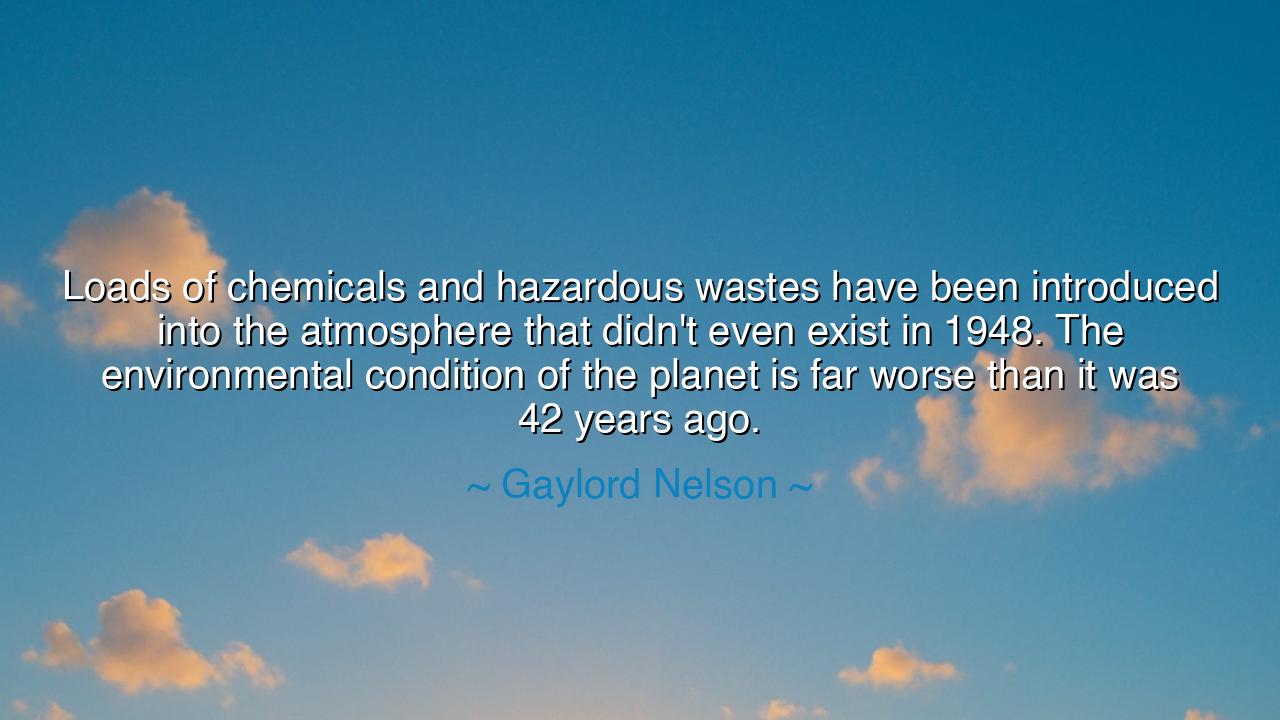
Loads of chemicals and hazardous wastes have been introduced into
Loads of chemicals and hazardous wastes have been introduced into the atmosphere that didn't even exist in 1948. The environmental condition of the planet is far worse than it was 42 years ago.






When Gaylord Nelson, the founder of Earth Day, spoke the words — “Loads of chemicals and hazardous wastes have been introduced into the atmosphere that didn’t even exist in 1948. The environmental condition of the planet is far worse than it was 42 years ago.” — he was sounding not only an alarm but a lament of conscience. His words are not those of despair, but of awakening — the cry of a man who had looked upon the Earth and seen how the hands of progress had also become instruments of destruction. Through this truth, he reminded humanity that advancement without awareness is not progress, but peril. He spoke as the ancients once did, warning their people that when humankind forgets the sacred balance between creation and preservation, the Earth herself will rise to remind them.
The origin of this quote lies in the late 20th century, when Nelson reflected on the environmental crisis that had worsened since the postwar boom. In 1948, industrialization had been a symbol of human triumph — the factories roared, the cities expanded, the engines of modern life seemed unstoppable. But by 1990, Nelson saw the shadow cast by that triumph: rivers thick with poison, air darkened by invisible toxins, and soil burdened with chemicals and hazardous wastes that nature had never known before. These were not ancient poisons — they were man-made creations, the byproducts of unchecked ambition, born from the same intellect that split the atom and conquered the sky. Nelson’s reflection carries the weight of a prophet’s sorrow, one who loves humanity but mourns its blindness.
To the ancients, the Earth was not an object but a living mother, a sacred being who nourished all life and demanded respect in return. The Greeks called her Gaia, the Hindus named her Prithvi, and the Native Americans simply called her Mother. Each tradition, though separated by oceans and time, shared the same wisdom: to take without gratitude was to wound the world. Nelson’s words echo this eternal truth — that the degradation of the planet is not a technical failure, but a spiritual one. For every factory that belches smoke, there is a soul that has forgotten reverence; for every river that burns with waste, there is a heart that has ceased to feel awe.
Consider the tragedy of Love Canal in the United States, where chemical waste buried beneath a neighborhood began to leak into homes and schools, poisoning the people who lived above it. Children fell ill, families were displaced, and the soil itself became toxic. This was not an isolated event, but a symbol of what Nelson spoke of — a wound inflicted by our own indifference. Like the myth of King Midas, who turned all he touched to gold until even his food and daughter became lifeless, humanity too discovered that prosperity without wisdom turns to ruin.
And yet, Nelson’s voice was not one of hopelessness. He believed deeply in the power of renewal. The same human mind that had created these poisons could also devise their cures. What made his warning sacred was its call to sustained responsibility — to act not once in outrage, but continually in stewardship. He had seen that the health of the planet cannot be restored by speeches or single gestures, but by a change of heart, a reawakening of the ancient bond between humankind and nature.
His message remains urgent even now, for the poisons he spoke of have not vanished — they have multiplied and evolved. New chemicals, new plastics, new emissions fill the air and seas, while forests fall and oceans warm. But there is still time, he reminds us, if we live by the ethic of care. Like gardeners tending a sacred grove, we must heal not only the Earth but the spirit that allowed her to suffer. Each small act — planting a tree, reducing waste, choosing compassion over convenience — becomes a ritual of restoration, a prayer turned into motion.
From Gaylord Nelson’s vision flows an eternal lesson: to honor the Earth is to honor ourselves, for her breath is our breath, her waters our blood, her balance our peace. The path of healing begins with awareness — to see clearly the damage done, yet also to believe in the strength to repair it. Let every generation take up this sacred duty, to cleanse what was polluted and to protect what still lives. For the Earth, though wounded, still offers her hand. She does not ask for perfection — only remembrance.
So let these words be carried forward like ancient scripture: we are the guardians, not the masters, of this world. Let every act, great or small, be guided by the question Nelson himself lived by — will this bring healing, or harm? For when humanity once again walks gently upon the Earth, when our inventions serve life instead of conquering it, then perhaps the air will grow clear, the rivers will sing again, and the future will look back upon us — not as destroyers, but as those who remembered the way home.






AAdministratorAdministrator
Welcome, honored guests. Please leave a comment, we will respond soon